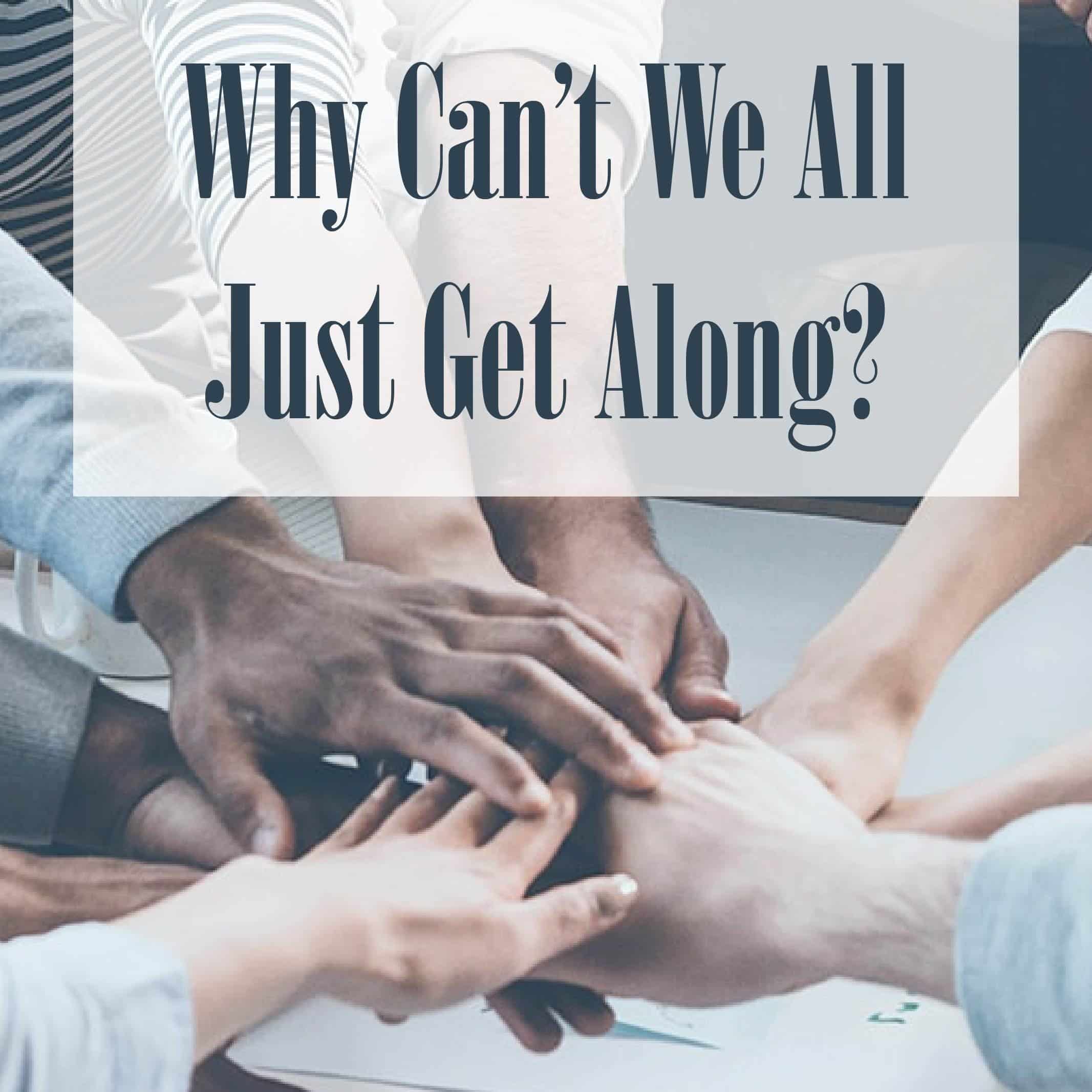Be reconciled to God. For He made Him who knew no sin to be sin for us, that we might become the righteousness of God in Him. – 2 Corinthians 5:20, 21
Those of us who watched the 1992 drama unfold here in Los Angeles are unlikely to ever forget it—the flashpoint of human anger spilling into violence and insurrection. Businesses were burned, bystanders beaten. People seeking retribution for injustice became caught up in a rage that poured forth its own inequity and destruction. In the midst of this complex and painful situation came a seemingly simplistic plea from motorist Rodney King, the man whose tragic case had precipitated the whole event: “Can we all just get along?”
The issue of reconciliation is fundamental not only to why humanity can’t seem to “just get along” but even more so as it relates to the restoration of our relationship to God, broken at the Fall. It is only by the recovery of fellowship with God, offered to all through the sacrifice of His Son, Jesus Christ, that we have any basis for becoming reconciled to one another amid the reality of the differences and difficulties that drive people apart.
So why can’t we all just get along? Because there is no power in human will, human flesh, or human systems for the kind of generosity needed for people to overcome the inherent injustice of fallen humanity living in a broken world. The milk of human kindness can only go so far. True reconciliation only comes about through grace, and grace only flows by the power of the love of God and the blood of Jesus Christ that begins to work new creation in people.
Reconciliation will not take place by simply addressing problems, but when we begin to deal with people. We can live life on policies and opinions and things that we perceive are violations of us, or we, as believers in Jesus Christ, can come to terms with relating to people. And what are those terms? The apostle Paul, writing to the church at Corinth, put it this way:
For the love of Christ compels us, because we judge thus: that if One died for all, then all died; and He died for all, that those who live should live no longer for themselves, but for Him who died for them and rose again. Therefore, from now on, we regard no one according to the flesh. – 2 Corinthians 5:14-15
Paul is saying that the love of Christ compels us because we have drawn this conclusion: If Jesus died for everybody, then everybody was lost. Separated from God, absent of relationship with Him, people may have existence, but there is no life. When we receive new life in Jesus Christ, the terms we’re given for relationship are that we no longer live for ourselves but “for Him who died for us and rose again.”
In Christ, we become compelled by His love, driven by a passion for others to know Him, and constrained toward a way of living that is no longer the way of flesh. Flesh will always argue its case, its rights. However, the apostle Paul continues:
Therefore, if anyone is in Christ, he is a new creation; old things have passed away; behold, all things have become new. Now all things are of God, who has reconciled us to Himself through Jesus Christ, and has given us the ministry of reconciliation, that is, that God was in Christ reconciling the world to Himself, not imputing their trespasses to them, and has committed to us the word of reconciliation. (vv. 17-19)
It says here that in Christ, God was “reconciling the world to Himself, not imputing their trespasses to them.” All the charges of our past failure and sin were stacked up against us, and God made a judgment not to hold our violations of Him to our record. It was not a matter of God sacrificing His holy standards, but rather at the Cross, He made a choice to reach out to us in reconciliation. Still, sin had to be dealt with, and it cost God something very precious—the life of His Son.
Further, it says that God has “committed to us the word of reconciliation.” From the Cross, we are issued a summons, along with the power to live that out. Just as you and I have been reconciled to God through Jesus Christ, we also are called to be reconciled to a mission:
Now then, we are ambassadors for Christ, as though God were pleading through us: we implore you on Christ’s behalf, be reconciled to God. For He made Him who knew no sin to be sin for us, that we might become the righteousness of God in Him. (vv. 20-21)
It’s important to understand that when Paul writes, “Be reconciled to God,” he is writing to the church, a gathering of believers. This is not an appeal to people who don’t know the Lord, but obviously that’s the passion driving his words: That the love of Christ constrains us toward a way of living born of a marvel so profound we choose to no longer live for ourselves but for Him.
Once we have received that gift of new birth, of salvation and forgiveness of sin, we are then appointed ambassadors for Christ and given a directive as His Kingdom representatives: To serve the ministry of reconciliation.
That brings us to coming to terms with another fact: In Christ, we have been born into another Kingdom, into another realm of rule. It will be up to us to choose whether that Kingdom will dominate our lives, or if we will be dominated by the flesh, the culture, and the politics of our world-the “me”-centered system that forgets I have been purchased at an enormous price by the blood of Christ. If I have been forgiven of so great a debt, how can I possibly carry a sense of others’ indebtedness to me when they violate me or encroach upon my convenience?
Paul is saying that as those who have received new life in Jesus Christ, we are driven by a passion for people—that passion is for others to receive the joy, the grace, the eternal hope and the victory of His life. And when that passion possesses me, my life is no longer “all about me.” That passion begets a new value: Life is all about Jesus and His agenda.
The Greek word for “reconciliation” that occurs here is katallasso, and it indicates that we are brought into a face-to-face confrontation with reality: We who have been forgiven so grandly are summoned to flow the same grace to others. And that’s the personal challenge each of us face when we struggle over issues with people whom we feel have violated us. I don’t have a solution for those injustices; I just have a directive from the Lord: “Freely you have received, freely give” (Matthew 10:7).
We must relate to others with a generosity and graciousness that, while not deficient of conviction, is neither in the confrontational spirit of the world. We will never win anyone over by anger. Battles in the Spirit cannot be won by wrestling in the flesh. We must be compelled by the love of Christ, recognizing that it is impossible for people who are spiritually dead to relate any other way than the way finite human reason dictates. What Paul is saying to us is that there is a dead world out there, and the only way to touch it is by the love of Christ. When that becomes powerful in us, it will draw the lost out of their darkness and into the warmth of His light.
The difficulty all of us face in living out that kind of grace is that when we set aside our own rights, we become horribly vulnerable. Yet the most vulnerable Person in history was beaten and made sin for us, though He knew no sin, in order that we may have the release of His righteousness in us. Jesus wants to work this in you and me. It is a process. It starts by letting the Word of reconciliation become a seed that will grow in us. That seed releases a passion that begets a new value in us: To no longer regard people according to the flesh. Our life becomes all about His agenda, not ours, because having been born into the new creation, the old things are passed away.
How many times have we praised the Lord for His deliverance, His healing, His provision-for all the marvelous things He’s done for us? Yet that’s only half the deal. Having forgiven and reconciled us to Himself, Jesus now wants to ignite in us the same grace that made those things possible, and turn us loose in a world where people will be amazed that we do not respond to the conflicts that beset us with their “get-even” values. We are not called to be doormats but to let the love of Christ so manifest in our lives that people will recognize we are operating from another Resource. And they will be drawn to that Resource through its display in our lives.
Do you desire relationship to be restored with God or with another person? The grounds for it all are these: Jesus paid a debt He did not owe to give me a gift I could not buy. The Lord calls us to live out to others the same grace He has shown to us. He purchased us unto Himself at the Cross, breaking down the wall between humankind and God, and releasing the flow of His power. It makes no difference how great our failure; His desire for relationship with us was more important than His rights as the blameless Son of God.
So how can we all get along? For reconciliation to occur, both parties have to die. In our case, it’s dying to self, dying to the “me” agenda. It begins to take place when we stop looking at problems and start passionately caring about people—people who need the love of Jesus.
Every believer is called to the ministry of reconciliation. It is not just the ministry of the gospel, but of a graciousness that will open people’s hearts to the gospel. It’s the ministry of a lifestyle so radically different from the world’s… and infinitely more joyous and beneficial in every way.
And every believer is appointed to be an ambassador for Christ. An ambassador is a person who represents another kingdom. They have no power in themselves; the power is entirely vested in the head of that state, kingdom or nation. But the ambassador is a fully enfranchised, empowered representative wherever they go.
Becoming reconciled to God happens at the Cross, but becoming an ambassador for Christ and serving the ministry of reconciliation is a process. We will all begin to get along when we each decide to grow. And if you will open to the seed of His Word in your heart, the Lord will cause it to flourish, releasing His grace and power that will become ministry through you.
Copyright © 2005 Jack W. Hayford, Jack Hayford Ministries, Van Nuys, CA 91405
Our gift of this article is made possible by your gracious support of the ministry of Pastor Jack Hayford. Partner with us online or call us toll-free to donate 1-800-776-8180 (within the U.S.).





